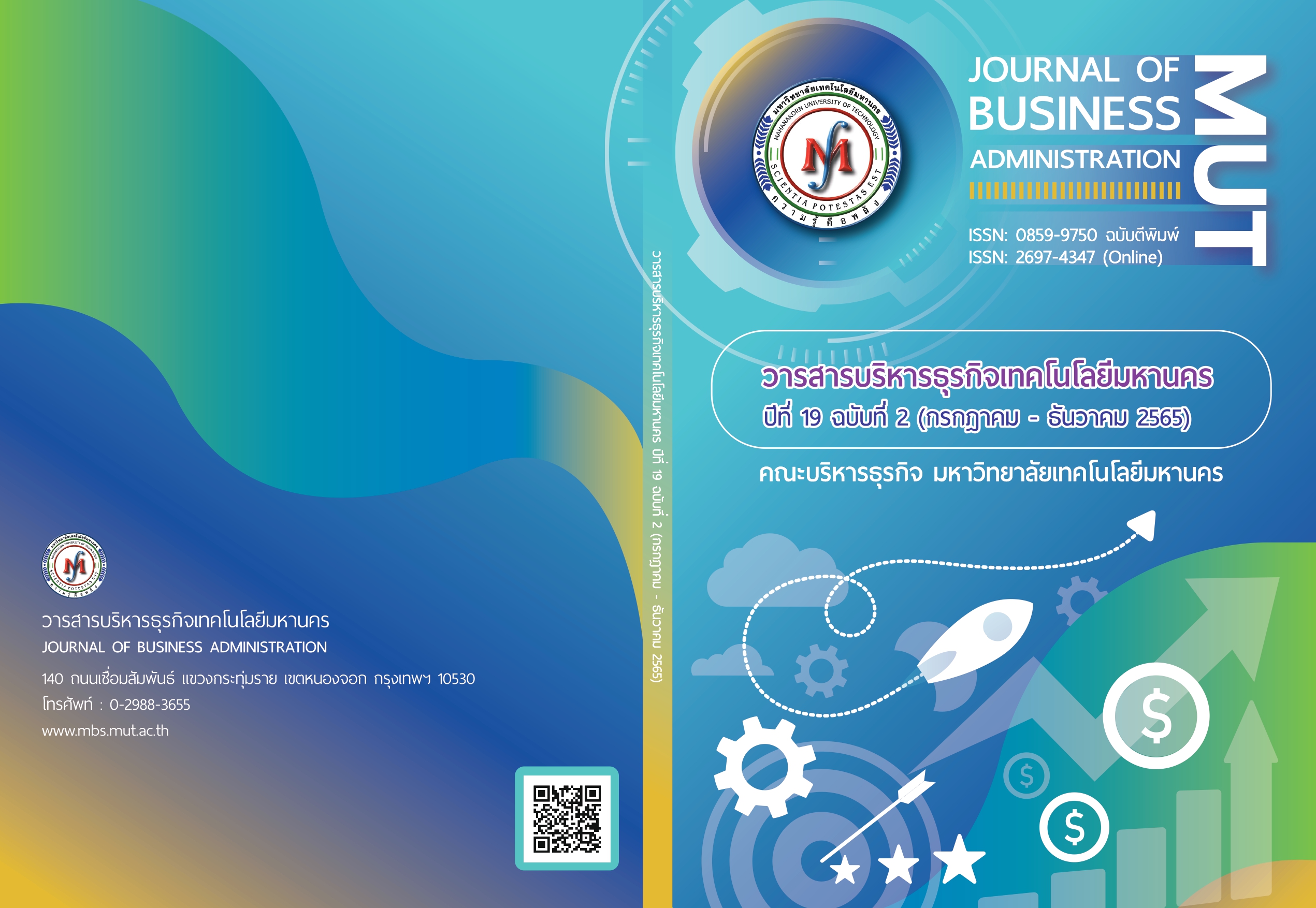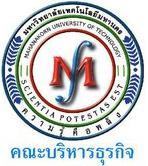Experiential Marketing Strategies in the Workshop for Taking Beautiful Photos with a Digital Camera of High School Students in Kanchanaburi Province that Influenced Customer Perception
Keywords:
Experiential Marketing Strategy, Photography, Consumer Perception, Consumer OpinionAbstract
The Bachelor of Communication Arts Program, Kanchanaburi Rajabhat University organized “The workshop for Taking Beautiful Photos with a Digital Camera of High School Students in Kanchanaburi Province” using five experiential marketing strategies: sense, feel, think, act, and relate to create consumer perceptions and affect the decision to study for the Bachelor of Communication Arts Program, Kanchanaburi Rajabhat University.
This research aims to study consumer opinions on experiential marketing strategies in the workshop for taking beautiful photos with a digital camera of high school students in Kanchanaburi Province, to study the level of customer perceptions towards the workshop for taking beautiful photos with a digital camera of high school students in Kanchanaburi Province, and to study the influence of experiential marketing strategies in the workshop for taking beautiful photos with a digital camera of high school students in Kanchanaburi Province that affected consumer perceptions. The data were collected from 256 former students using survey-based questionnaires. The statistics used to analyze the data included percentage, frequency, mean, standard deviation, and multiple linear regression analysis. The statistical significance was at the level of 0.05.
The study found that the overall consumers’ opinions on experiential marketing strategies in the workshop for taking beautiful photos with a digital camera of high school students in Kanchanaburi Province was highest with an average of 4.54. It was found that the respondents had the highest level of opinions on experiential marketing strategies in side of thinking with an average of 4.69, followed by the action side at the highest level with an average of 4.68, and the relate side at the highest level with an average of 4.65.
The level of consumer perceptions towards experiential marketing strategies in the workshop for taking beautiful photos with a digital camera of high school students in Kanchanaburi Province as a whole was the highest with an average of 4.42. Respondents were found to have the highest level of perceptions towards learning with an average of 4.63, followed by relationship at the highest level with an average of 4.51, and on the display side at the highest level with an average of 4.48.
The overall experiential marketing strategies in the workshop for taking beautiful photos with a digital camera of high school students in Kanchanaburi Province influenced consumer perceptions by statistically significant. It had a regression coefficient of 0.127, with the observed significance level (P-value) = 0.004 below the specified significance level (P-value < .05).
References
Ai, L. 2021. A study of experiential marketing factors that influences the decision to buy Huawei products in Bangkok. Independent research master of Business Administration program. Bangkok: Bangkok University. 48.
Datta, V. 2017. A Conceptual study on experiential marketing: Importance, strategic issues and its impact. International Journal of Research- GRANTHAALAYAH. Vol. 5. No. 7. 27 – 28.
Grundey, D. 2008. Experiental Marketing vs. Traditional Marketing: Creating Rational and Emotional Liaisons with Consumers. The Romanian Economic Journal. Vol. 29. No. 3. 139 - 140.
Hongthong, T. 2018. Experimental marketing strategies that influence tourism decision making of foreign tourists in Chiang Mai. Independent research master of Business Administration program. Bangkok University. 58.
Hulten, B., Broweus, N. and Dijk, M. V. 2008. Sensory Marketing. London: Palgrave Macmillan. 16 - 19.
Kanchanaburi Rajabhat University. 2020. Report on the results of internal educational quality assessment of the Bachelor of Communication Arts program. Kanchanaburi: Kanchanaburi Rajabhat University. 44.
Kotler, P. and Kevin, L. K. 2012. Marketing Management. 14th ed. New Jersey: PrenticeHall International. 124 - 125.
Kwortnik, R. J. and Ross, Jr. T. 2007. The role of positive emotions in experiential decisions. International Journal of Research in Marketing. Vol 24. No. 4. 334.
Lindstrom, W. F., Holly, A. T., Douglas, G. and Frank, M. 2010. Driving as an Everyday Competence: A Model of Driving Competence and Behavior. Clinical Gerontologist. Vol. 33. No. 4. 283.
Mehran, G. H., Hamed, A. and Ali, A. 2016. An analytical study on customer perception of store environment and its effect on brand loyalty to joy of shopping (a case study: LG home appliance store). Problems and Perspectives in Management. Vol. 14. No.3. 387.
Numbang, K. 2019. Creating of new brand perception to consumer’s brand loyalty. A Thesis of Doctor of Philosophy (Management). Nakornpathom: Silpakorn University. 178 - 179.
Phunglun, K. 2016. Marketing Communication in Sensory Perception on Thai Dessert of Japanese Consumer in Tokyo, Japan. Independent research master of Business Administration program. Bangkok: Bangkok University. 61.
Pine, B. J. and Gilmore, J. H. 2013. Handbook on the experience economy. Cheltenham: UK: Edward Elgar. 269.
Pornsinithirathana, Y. 2019. The Investigation Of Relationship Between Brand Experience And Customer Brand Engagement Towards Consumer Purchase Intention: HomePro Case Study. Independent research master of Management program. Mahidol University. 39.
Puvattanasin, P. and Nurittamont, W. 2017. Experiential marketing and relationship quality influence on customer loyalty of bakery S&P shop in Bangkok and Metropolitan areas. Suthiparithat. Vol.31. No.100. 70.
Rak-U, T. 2013. The decision making to study at Kanchanaburi Rajabhat University of regular students in 2013. Independent research master of Business Administration program. Kanchanaburi: Kanchanaburi University. 76.
Rather, R. A. 2020. Customer experience and engagement in tourism destinations: the experiential marketing perspective. Journal of Travel & Tourism Marketing. Vol. 37. No. 1. 15.
Sakulrapeepat, S., Rungruang, P. and Wonglek, P. 2022. Marketing Mix Factors Relating Perceived Brand Equity of Southeast Bangkok College of High School Students (M.6) Samutprakarn Province. Southeast Bangkok Journal. Vol. 8. No. 1. Abstract.
Sammasut, T., Witoonphan, N., Yaniphan, K., Thomthanisa, D., Sirirak, P. and Klaypayong, P. 2021. The Sensory Experience Marketing Affecting Repurchasing through Customers’ Satisfaction with Cafe Business in Chonburi Province: A Case Study of Mongchang Café. International Journal Ubon Ratchathani Rajabhat University. Vol. 1. No. 3. 9.
Schiffman, L. G. and Kanuk, L. L. 1991. Consumer Behavior. 4th ed. Prentice-Hall international. NJ: Hoboken. 63 – 65.
Schmitt, B. 1999. Experiential marketing. Journal of Marketing Management. Vol 15. No. 1 - 3. 55 - 60.
Srapanya, S. and Phanthumsut, K. 2021. Perceptions and attitudes on purchase intentions through integrated sales channels (Omni channel) of consumer electric machine shop, Tukcom Pattaya branch. The 9th National Conference 2021 Faculty of Management Science. Phetchaburi: Silpakorn University. 147.
Trakoonsom, P. 2016. Exhibition Organizing Strategies: The Marketing Communication Tool to Generate Experience to Customers. Journal of Communication and Management NIDA. Vol 2. No. 3. 62.
Verhoef, P. C., Lemon K. N., Parasuraman, A. Anne R., Tsiros, M., and Schlesinger, L. A. 2009. Customer Experience Creation: Determinants, Dynamics and Management Strategies. Journal of Retailing. Vol. 85. No. 1. 32.
Downloads
Published
Issue
Section
License

This work is licensed under a Creative Commons Attribution-NonCommercial-NoDerivatives 4.0 International License.
ข้อความ ข้อคิดเห็น ข้อมูล เนื้อหา รูปภาพ แผนภูมิ แผนผัง เป็นต้น ที่ปรากฏและแสดงในบทความต่างๆ ในวารสารบริหารธุรกิจเทคโนโลยีมหานคร ถือเป็นความรับผิดชอบโดยตรงของผู้เขียนบทความนั้นๆ มิใช่เป็นความรับผิดชอบใดๆ ของวารสารบริหารธุรกิจเทคโนโลยีมหานคร และมหาวิทยาลัยเทคโนโลยีมหานคร
บทความที่ตีพิมพ์ในวารสารบริหารธุรกิจเทคโนโลยีมหานคร ถือเป็นลิขสิทธิ์เฉพาะของคณะบริหารธุรกิจ มหาวิทยาลัยเทคโนโลยีมหานคร หากบุคคลหรือหน่วยงานใดต้องการนำทั้งหมดหรือส่วนใดส่วนหนึ่งไปเผยแพร่ต่อหรือเพื่อกระทำการใดๆ จะต้องได้รับการอนุญาตเป็นลายลักษณ์อักษรจากคณะบริหารธุรกิจ มหาวิทยาลัยเทคโนโลยีมหานครก่อนเท่านั้น


